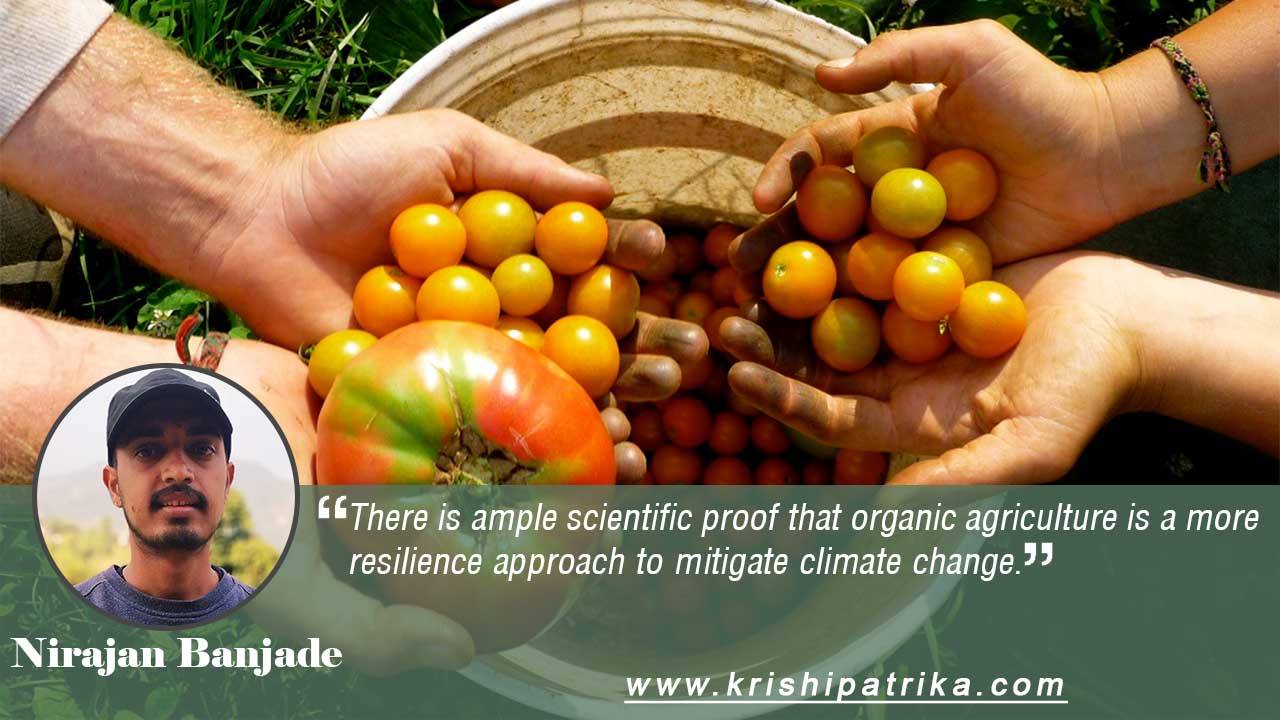
Climate change is a serious threat to agriculture and food security. Green House Gases (GHGs) results in increase of global mean temperature , alters precipitation pattern , disturbs cropping cycle , induce insect pest infestation , create favourable environment for microbial attack etc. Emission of Green House Gases (GHGs) is the most important driving thing of anthropogenic climate change . Agriculture contributes 10-14% of global anthropologic emission. If we look at the whole agricultural production chain , from fertilizer production to packaging , it even contributes to 33% of emission . Enteric fermentation ( methane ) application of synthetic fertilizers ( nitrous oxide) and tillage (carbon dioxide) are major source of agricultural emission of GHGs. Global reduction of Methane emission up to 48% relative to 2010 till 2030 and reduction of Nitrous Oxide emission up to 26% are required to limit global warming to 1.5 °C . Despite the recognition of agricultural emission in many reports and policy proposal , they are not yet implemented in international agreement such as the United Nations Framework Convention on Climate Change (UNFCCC) .
The Climate Change may cause major insecurities for world food supply if there are no mitigation measures adopted. There is ample scientific proof that Organic Agriculture is more resilience approach to mitigate climate change. There are many evidences to support organic farming as a tool to mitigate climate change in globe. Carbon sequestration , water holding capacity of soil , Increase in soil Organic Matter (OM) , avoidance of Synthesis Fertilizer, discouraging deforestation , changing people food behaviour , low emission of methane , use of biofuel are some points to support organic agriculture towards mitigation of climate change. If only half of all available crop land shifts to regenerative organic agriculture and no change made in pasture management , we would meet the threshold of 41 GtCO2e that makes many scenario for limiting warming to 1.5°C feasible.
Carbon Sequestration is the process of capturing and storing atmospheric carbon dioxide that would otherwise be emitted to , or remain , in the atmosphere . There are evidences that organic agriculture manage to keep more carbon stored in the soil . Crop residues , minimum tillage ,maximum use of compost and FYM increases organic matter in the soil , lowers the amount of CO 2 in the air. International studies in the USA and Germany concluded that organic soil have a better water holding capacity which protects us from various natural calamities like flood and landslide and increase productivity of the soil . Organic agriculture rejects the use of chemical fertilizer, insecticides, pesticides and any other forms of chemicals. The fertilizer production consumes approximately 1.2% of the worlds energy and is responsible for approximately 1.2% of the total emission . Avoiding fertilize and chemicals could reduce the production of Nitrous Oxide heavily . Proper organic livestock practices is found to reduce the enteric fermentation of cattle.
In sum up , Organic Agriculture supports both Green House Gases(GHGs) reduction as well as the development of resilience farming system for adoption . At this crucial phase ,right action is must to limit the global mean temperature at 1.5°C and is best possible through Organic Agriculture .









